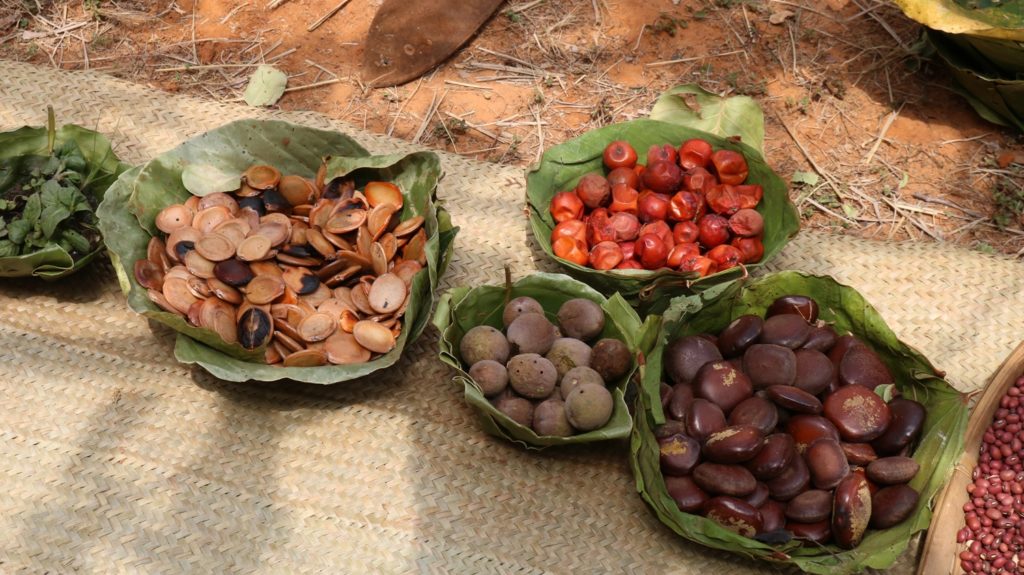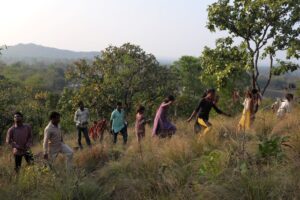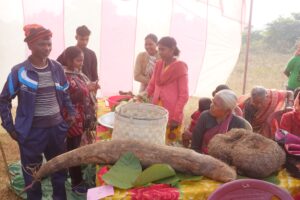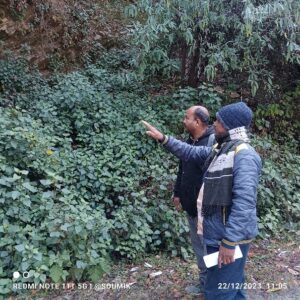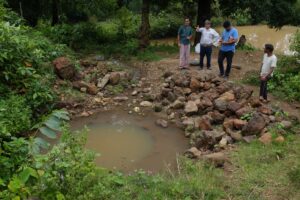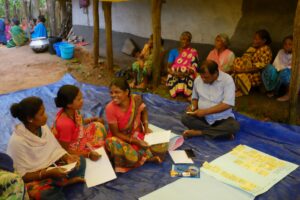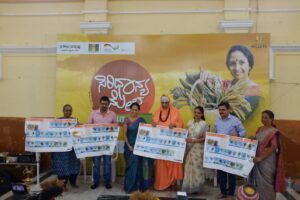On the 12th of March 2019 Using Diversity partner organisation, Nirman and the UD fellows for Raigarh District organised an Uncultivated Food and Traditional seed Mela at Kenda village. The Mela highlighted the rich diversity of uncultivated food and traditional crops of the Pahari Korwas of the region. The program, held at Kenda village located at the foothills of Chui Pahar which is home to 7 Pahari Korwa villages, attracted men and women Pahari Korwa villagers from across 8 villages of Dharmjaigarh Block.
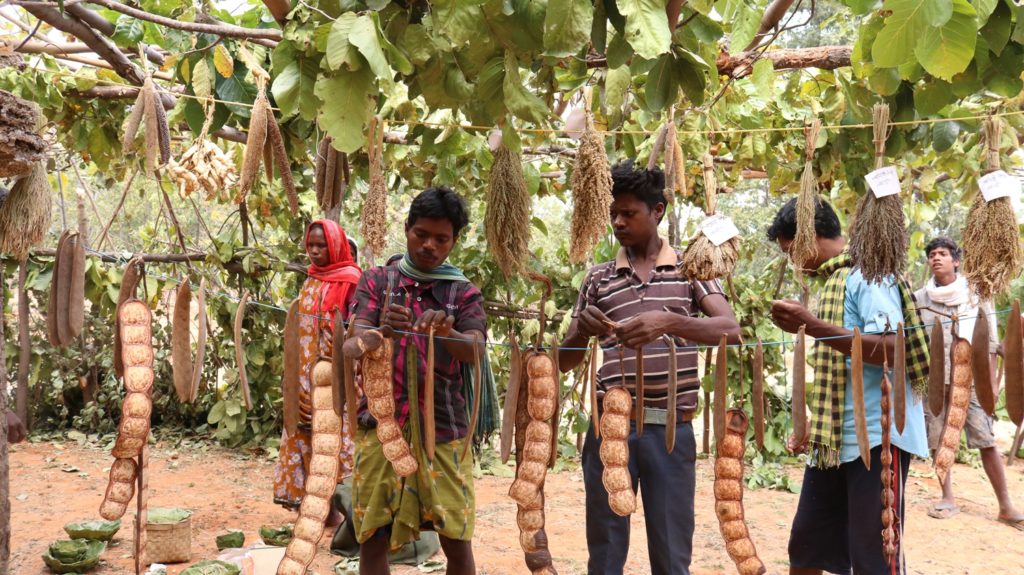
The Pahari Korwas are one of Chhattisgarh’s 5 tribal groups notified as Particularly Vulnerable Tribal Groups. The current UD project is engaging with 11 Pahari Korwa villages in Dharmjaigarh Block of Raigarh district Chhattisgarh and project activities are being carried out by community fellow Bhawaru Ram Hansda and Jaykumar Yadav who were responsible for organising the Mela.
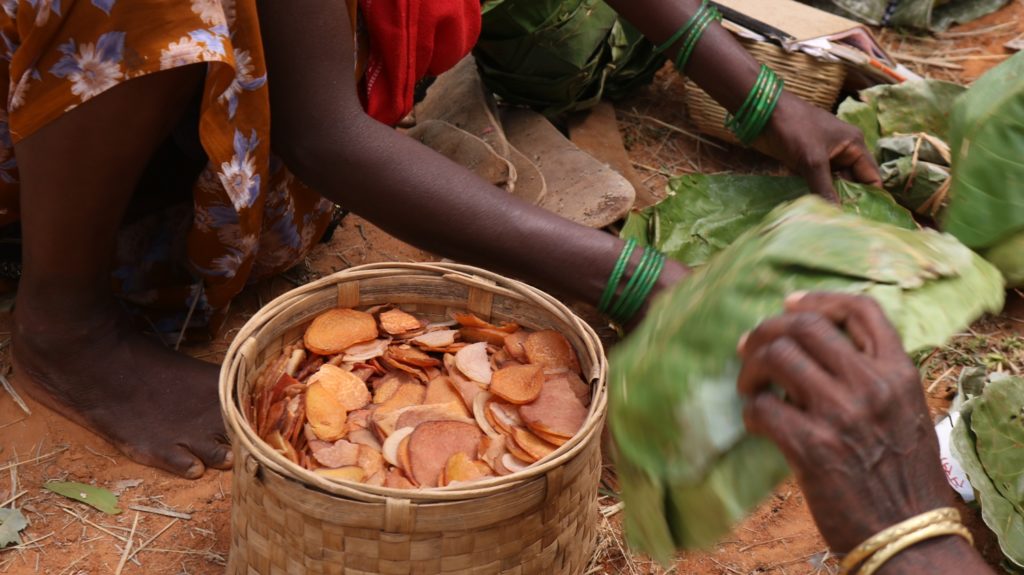
The Pahari Korwas have a rich tradition of using and consuming a wide variety of wild and uncultivated foods several of which were on display. The wild foods on display included wild leafy vegetables – both fresh and dried, a variety of tubers, mushrooms and several wild fruits.
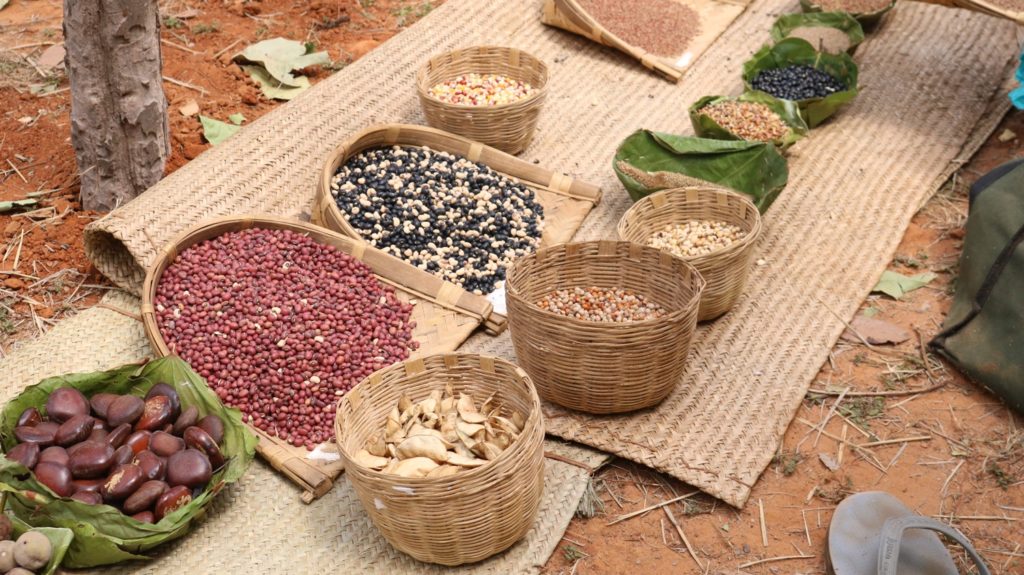
The traditional crop diversity of the Pahari Korwas was also on display. Over 20 different varieties of that The Pahari Korwas cultivate a variety millets, pulses, beans, rice, maize and vegetables either through their traditional agricultural practice of Bewara or in their mixed cropping homestead gardens or Badis. Over 20 varieties of traditional seeds were on display. Baccha Ram from Sirdahi village pointed out that Bewara is like an elephants stomach for the Pahari Korwas, as they grow a huge variety of crops like sokda, jhunga, kang, madia, bede, makka and even dhan which meet all their dietary needs in their Bewara plots.

The event was also graced by three forest gaurds – Jayandra Singh Rajput, N. B. Bhaskar and Depak Porte. While they were initially suspicious of the program they took the time to view all the uncultivated food and traditional seeds on display and were very impressed to see such a variety of wild food on display some of which they had never come across before.
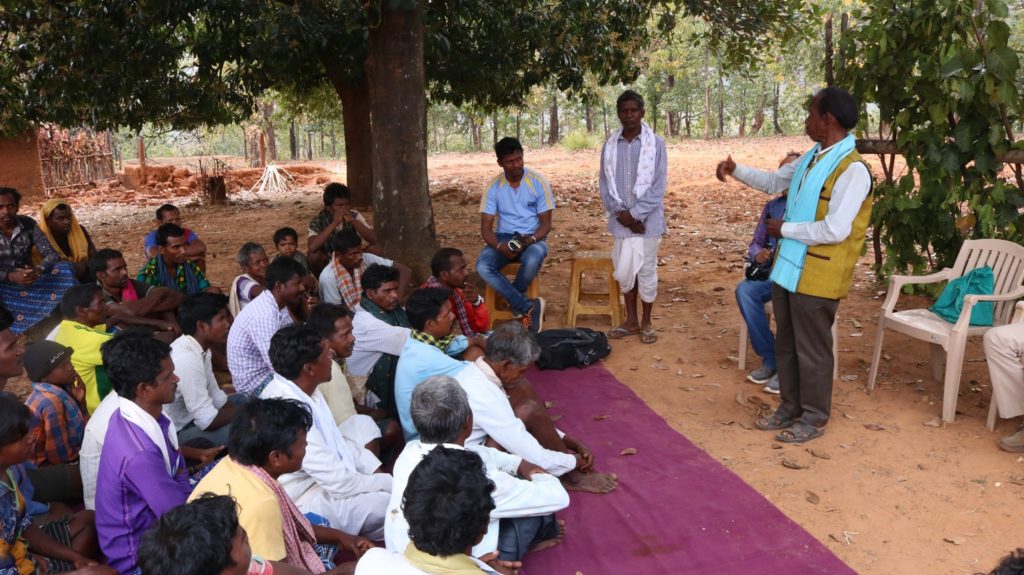
The program was opened by local activist Ghasi Ram from Khamar village. He welcomed all participants and started his address by raising the issue of gender equality. He stressed the importance of women in society and asked the gathering why women always take a backseat to men symbolised by the seating arrangement at this gathering itself where the women naturally drifted to the back behind all the male participants. The women were encouraged to speak up and share the issues and challenges they face and the men were encouraged to give them the support they need to speak up.
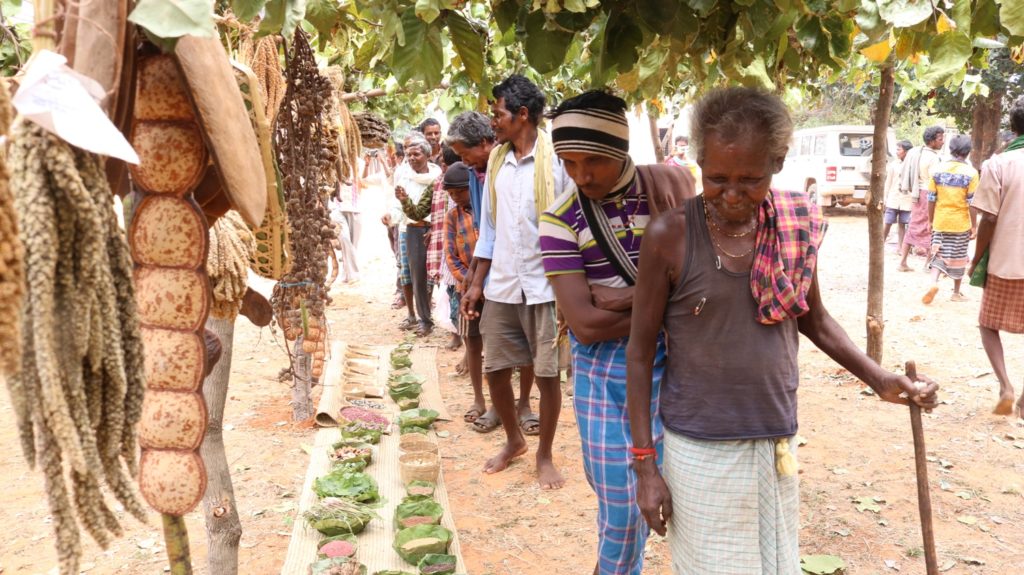
The women and men then took turns to view the exhibiton of wild food and traditional seeds with all of them pointing out and identifying the diffent items on display. The participants were thrilled to see the wide range of their wild foods and traditional seeds on display, several of which have now become rare. The participants then shared what their favourite foods were. One woman shared that she relishes kang because of its excellent taste which she compared to milk and the fact that it cooks fast. Another woman pointed out that her favourite crop was makka as they eat it in a variety of forms like roasted, boiled, paanch, roti and rice.
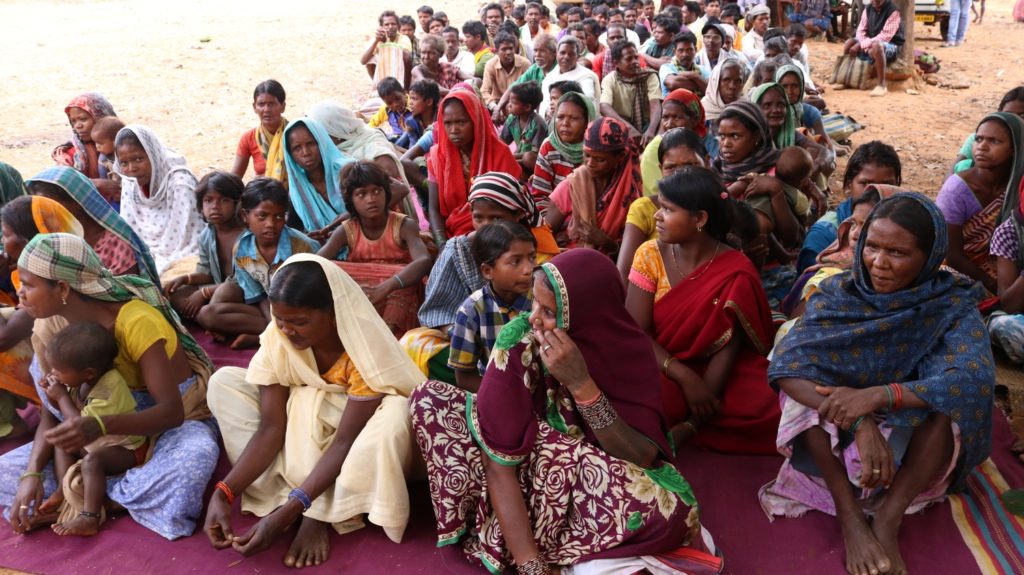
Naresh Biswas, the chief functionary Nirman, addressed the gathering and discussed a variety of the challenges facing the Pahari Korwas of Raigarh District. He pointed out how the Pahari Korwas are classified by the Government as a Particularly Vulnerable Tribal Group (PVTG) and as a result a number a special schemes, benefits and facilities are available to them like special reservation in government posts like Police, Patwari, Teachers. However, these plains Korwas are fighting for the same status and this will negatively impact the Pahari Korwas as their opportunities will dwindle in the face of competition for the same benefits with the plains Korwas. He also discussed the current Supreme Court verdict which ordered the eviction of adivasis and other forest dwellers whose FRA claims had been rejected as well as the stay and subsequent directive to the Central and State government to review and process forest rights claims within the next four months. The villagers were not aware of these developments and stated that only a few had received IFR titles despite a majority of them filling and submitting IFR forms. With regards to community forest rights there was very little clarity and only a few villages had filed claims. Naresh also spoke about the Habitat Rights clause for PVTG communities and pointed out that the Pahari Korwa villages of Chui Pahar have tremendous potential to receive habitat rights to Chui Pahar along the line of the Baigas of Baigachak in Dindori who recently received habitat rights. He emphasised that the villagers of Chui Pahar should come together to prepare and submit a Habitat Rights claim for Chui Pahar which will help secure their rights to their forests and land and prevent encroachment by outsiders and excesses of the Forest Department. The other Pahari Korwa villages of Raigarh District should also come together to claim and follow up on IFR and CFR titles. He informed the gathering that in the light of the current Supreme Court orders and directives the Collector of Raigarh would be conducting a consultation with all major stakeholders on the status of FRA and its implementation with a focus on IFR and CFR claims. The villagers should capitalise on this to highlight their claims and challenges being faced with regards to receiving titles, both CFR and IFR, and also point out the potential of Chui Pahar to receive habitat rights. He emphasised the urgent need for the Pahari Korwas to come together in the next four months to ensure that IFR claims of all residents are processed and also to submit and draw attention to CFR and habitat rights claims.
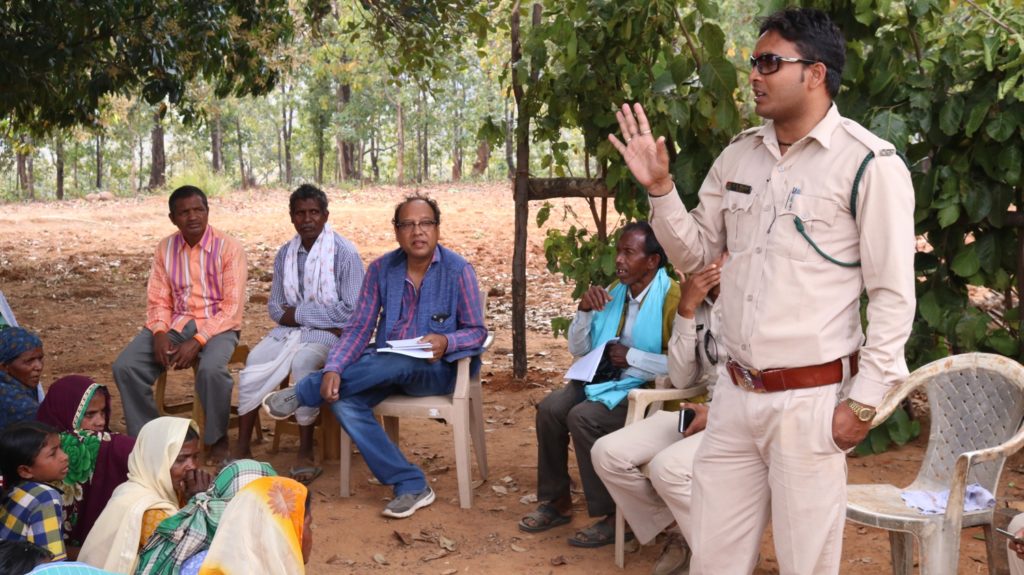
The senior most Forest Guard also addressed the gathering and shared how impressed he and his colleagues were with the rich diversity of wild food and traditional seeds that were on display. He admitted that he was seeing most of the wild foods for the first time and urged the organisers to hold such melas at other areas at well in order to improve awareness of the manifold benefits received from forests. He also explained the role he and his collegues in the Forest Department play in protecting the region’s forests. He stressed the importance of protecting and safeguarding forests from rampant fires and illegal logging. He also listed the other benefits of forests like fire, water conservation and ensuring regular rainfall. He urged the villagers present to support the Forest Department in protecting forests and coming together to combat forest fires.
Naresh Biswas also raised the issue of how Government and Forest Department plantation schemes promote species like Eucalyptus and other non native species that are not useful either to the adivasis of the region or wildlife like bears, deer, monkeys and birds. He urged the villagers present to urge concerned authorities to plant species that are beneficial to both adivasis and wildlife and to involve the local communities in decision making with regards to tree species to be selected for plantation programs.

The program ended with a meal of Bede rice, lentils and a sag which was enjoyed by the villagers and guests alike. The villagers pledged come together as a community and a plan was drawn up for representatives of all 22 Pahari Korwa villages of Raigarh district to meet and pursue IFR and CFR claims as well as a Habitat Rights claim for Chui Pahar.

